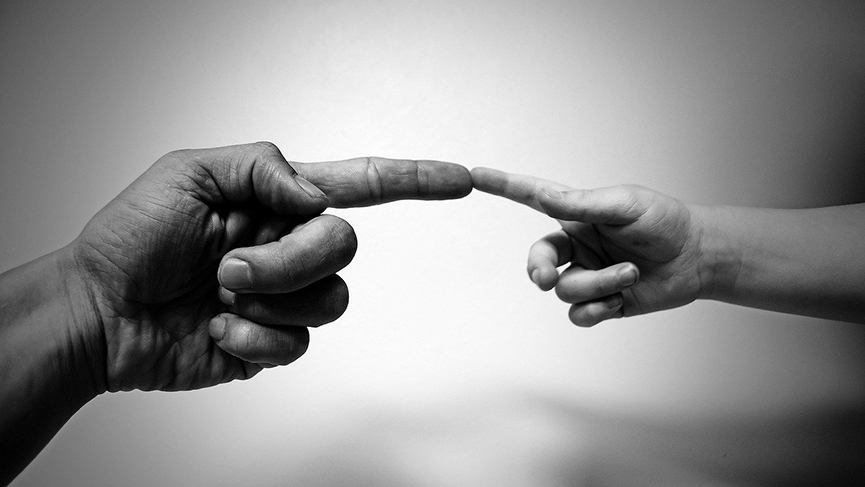Out of touch. Not for too long.

International
In an open letter, Carl Hétu, director of the Canadian office of the Catholic Near East Welfare Association (CNEWA), looks back on his recent trip to the Holy Land and recounts how a young Gazan girl “touched [his] heart, without saying a word.”
By Carl Hetu,
Canadian National Director of the Catholic Near East Welfare Association
Social distancing is now the new norm, but how long until it overstays its welcome? The memory of a Gazan girl gives me reason to wonder.
It was a clouded and cold day in Gaza, January 12, at the beginning of a promising 2020. I had travelled with the bishops of Canada, USA and Europe (France, Germany, England, Spain, and Italy) on an annual visit to show solidarity with the few remaining Catholics who live in this war-torn part of the world.
We arrived from a two-hour drive from Jerusalem going through a well elaborated Israeli check point and drove to the only Catholic parish of Gaza called Holy Family. That parish serves about 150 Catholics who live in this modest Gazan neighbourhood. Behind the compound of the church we walked to a house hidden by a large tree and children’s park. That’s where we found our hosts for the afternoon – The Missionaries of Charity.
The nuns run a comprehensive facility for children and adults with special needs, ministering to the mentally and physically handicapped, as well as their families. As we meandered through the hallways, single file, I anticipated that speeches and formal handshakes would mark the conclusion of our visit.
Before departing, our delegation entered a busy hall where 20 people were confined to their wheelchairs, many immobilised since birth. An unfortunate or distressing sight for some, it was clear the sisters who lived and worked here considered it a privilege to work with these persons in need. For a brief second, it seemed their introduction of the residents was over-the-top – more like an introduction of a renowned pop star than any ordinary person.
I stayed at the doorstep, looking into the room, with no intention of entering (I have a son who was born intellectually challenged and he gets very excited when too many people show up at the same time). So I felt it was better keeping the number of people down.
As I made my way to the exit, I saw one of the youngest persons looking at me. She was completely alone, seemingly immobile in her wheelchair. I could have easily missed her. But she hadn’t missed me.
I approached cautiously and looked at her. She couldn’t move her head, arms or legs, but her eyes followed me. To the left. To the right. We connected and I smiled but got no response. I then approached her, putting my fingers in the palm of her hand delicately so as to not shock her and, as I did, she gently closed her hand around my fingers. Then she gave me an unexpected smile. I smiled back. It didn’t last long but I felt she was telling me, “Nice to meet you. Thank you for stopping by. I really appreciated it.”
Then it was time to go. I didn’t even get her name. It didn’t matter. The feeling in my heart was more important to me than any name.
Despite her condition, she was able to truly touch me – on par with life’s finer moments. There was no need for frivolous speeches, no political wrangling or ideological debates on Gaza or other issues. She couldn’t care less about my status, title, or way of dressing. The only thing she cared about was connecting, heart to heart. Nothing else was needed. I suspect she is like this with anyone who crosses her path. Silent, reserved and yet fully expressive when given the chance.
According to some, this Gazan girl, or anyone like her in the world, might have little to contribute to our society. But give her a moment and she just might pass along one of life’s greatest lessons. She reminds me still today of my humanity, and yours, and our need to have compassion for one another. That’s when personal growth and a conversion of heart can take place. Then we can endeavour to find peace within ourselves, and then others. This is what I joined CNEWA to do.
As we look at this historic pandemic, let us keep an open mind on the value of a personal encounter such as this one – with an inspiring Gazan girl who touched my hand, and my heart. In the spirit of Easter and the resurrection of Jesus, maybe this pandemic will give us a new way to relate with one another and see what is so special in the other, instead of focusing on the negative. But now, as the Coronavirus makes its way into Gaza, I fear for my new friend. Indeed, the Gaza healthcare system is in no way equipped to face a pandemic -- and many won’t survive.
Carl Hétu is the Canadian National Director of the Catholic Near East Welfare Association, an agency of the Holy See that supports the churches and peoples of the Middle East, Eastern Europe, Northeast Africa and India. Information at cnewa.ca.

Comment
Comment
Add new comment